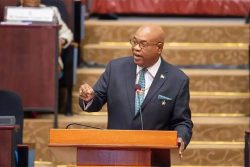UNITED NATIONS, (Reuters) – The U.N. Security Council yesterday unanimously approved wider sanctions against North Korea over its May 25 nuclear test, a move close ally China said showed firm opposition to Pyongyang’s atomic ambitions.
The sanctions resolution banned all weapons exports from North Korea and most arms imports into the reclusive Communist state. It authorized U.N. member states to inspect North Korean sea, air and land cargo, requiring them to seize and destroy any goods transported in violation of the sanctions.
Both China and Russia, which had been reluctant to approve punitive measures against North Korea in the past, backed the U.S.-drafted resolution, which is binding under international law.
China’s U.N. ambassador, Zhang Yesui, said the resolution showed the “firm opposition” of the international community to North Korea’s nuclear ambitions, but he urged countries to exercise caution when inspecting North Korean cargo. “Under no circumstances should there be use or threat of the use of force,” Zhang said.
U.S. Ambassador Susan Rice said Washington would press for full implementation of the sanctions and would not get into a “tit-for-tat reaction” to every provocation from Pyongyang.
“It would not be a surprise if North Korea reacted to this very tough sanctions regime in a fashion that would be further provocation and further destabilizing,” she said.
U.N. Secretary-General Ban Ki-moon’s press office issued a statement welcoming the 15-nation council’s move. “Acting unanimously and agreeing on credible measures, the members of the Security Council have sent today a clear and strong message to (North Korea),” the statement said, adding that the South Korean U.N. chief would “spare no effort in facilitating the implementation of the resolution.”
The measures in the new resolution were covered in a 2006 sanctions resolution, though the new one has more detail and some of the measures — above all the arms embargo — have been expanded. If enforced, diplomats say it will make it difficult for Pyongyang to continue its nuclear and missile programs.
A study by the U.S.-based Institute for Foreign Policy Analysis think-tank this year estimated Pyongyang earns around $1.5 billion a year from missile sales. Asia Society executive vice president Jamie Metzl said it had exported arms to around 20 countries in the past, including Iran, Egypt, Pakistan, Myanmar, Zimbabwe and Sudan.
“Their finances are in big trouble. They have almost nothing that anybody else wants to buy but these arms,” Metzl said, describing arms sales, including the sale of nuclear knowhow, as a “financial lifeline” for North Korea.
North Korea, which prompted a period of high tension in the region with the nuclear blast followed by a series of missile tests and belligerent threats, did not send a representative to speak at the Security Council meeting.








